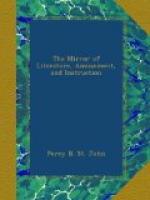“I have since been unable to help wishing, perhaps not very wisely, that Mr. Campbell would be a little less careful and fastidious in what he did for the public; for, after all, an author may reasonably be supposed to do best that which he is most inclined to do. It is our business to be grateful for what a poet sets before us, rather than to be wishing that his peaches were nectarines, or his Falernian Champagne. Mr. Campbell, as an author, is all for refinement and classicality, not, however, without a great deal of pathos and luxurious fancy.”
Mr. Campbell’s literary labours are perhaps too well known and estimated to require from us any thing more than a rapid enumeration of the most popular, as supplementary to this brief memoir. In his studies he exhibits great fondness for recondite subjects; and will frequently spend days in minute investigations into languages, which, in the result, are of little moment. But his ever-delightful theme is Greece, her arts, and literature. There he is at home: it was his earliest, and will, probably, be his latest study. There is no branch of poetry or history which has reached us from the “mother of arts” with which he is not familiar. He has severely criticised Mitford for his singular praise of the Lacedaemonians at the expense of the Athenians, and his preference of their barbarous laws to the legislation of the latter people. His lectures on Greek Poetry have appeared, in parts, in the New Monthly Magazine. He has also published Annals of Great Britain, from the Accession of George III. to the Peace of Amiens; and is the author of several articles on Poetry and Belles Lettres in the Edinburgh Encyclopoedia.
Among his poetical works, the minor pieces display considerably more energy than those of greater length. The Pleasures of Hope is entitled to rank as a British classic; and his Gertrude is perhaps one of the most chaste and delicate poems in the language. His fugitive pieces are more extensively known. Some of them rouse us like the notes of a war trumpet, and have become exceedingly popular; which every one who has heard the deep rolling voice of Braham or Phillips in Hohenlinden, will attest. Neither can we forget the beautiful Valedictory Stanzas to John Kemble, at the farewell dinner to that illustrious actor. Another piece, the Last Man, is indeed fine—and worthy of Byron. Of Campbell’s attachment to his native country we have already spoken, but as a finely-wrought specimen of this amiable passion we subjoin a brief poem:




